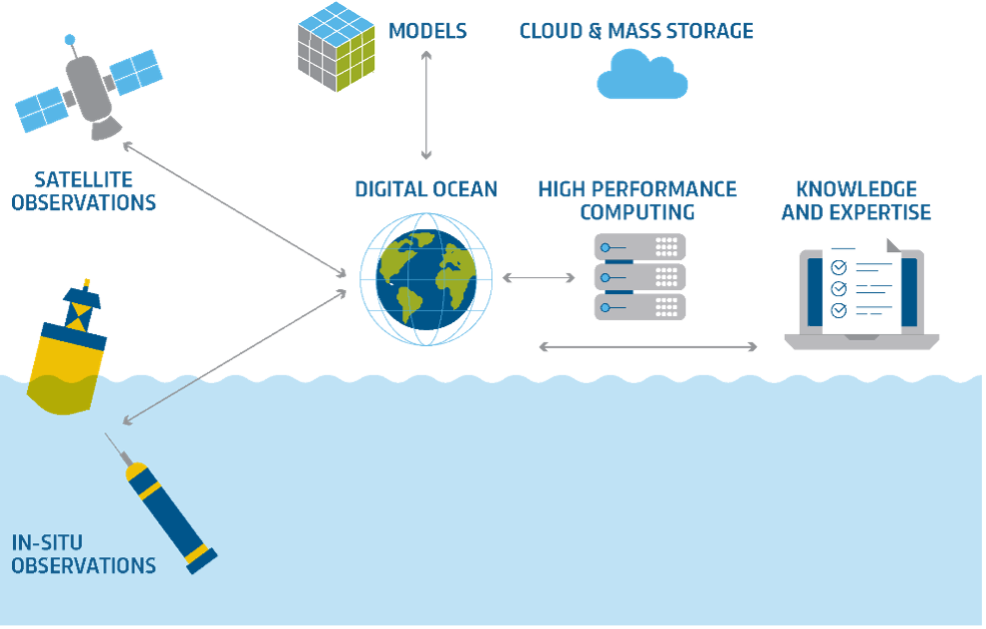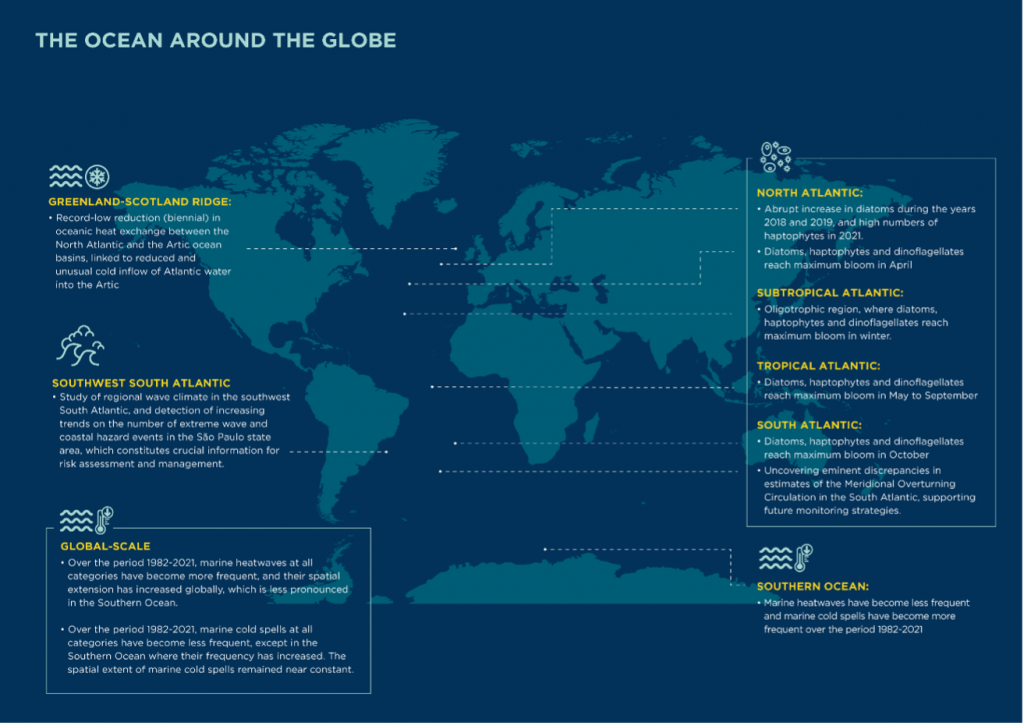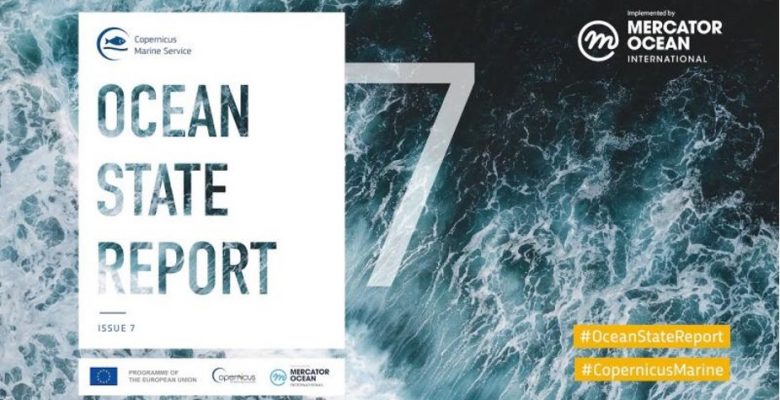A new report on the State of the Ocean has just been published. It reveals alarming changes in the world’s oceans, including rising sea temperatures and the disruption of ocean currents. It highlights the risks to ecosystems, biodiversity and coastal communities, underlining the urgent need for environmental action. A new call for collective awareness and concrete measures to mitigate the effects of climate change on the oceans.
by Laurie HENRY
A collaborative report
The Copernicus State of the Ocean Report (SOR) is an annual publication by Mercator Ocean International, which operates as part of the European Union’s marine service, Copernicus. Launched in 2015, the OSR has become a reference tool for monitoring the status, variability and ongoing changes in the global marine environment and Europe’s regional seas. It enables the informed decisions needed to protect and preserve our oceans.
The seventh report, OSR7, was published on 27 September 2023, against a backdrop of growing concern about climate change and its effects on the oceans. It is the result of an international collaboration involving more than 80 scientists and over 30 institutions in 14 countries. It compiles 13 peer-reviewed studies covering a wide range of topics relating to the state of the oceans, from physics to biogeochemistry and marine biology.

Process for compiling knowledge to produce a report on the state of the oceans © Ocean State Report 7 Summary, Copernicus Marine Service
A rising ocean thermometer
OSR7 has highlighted some worrying anomalies in ocean dynamics. The report details a significant increase in the frequency and intensity of marine heat waves, periods when water temperatures exceed seasonal norms for at least five consecutive days.
These phenomena, which used to be rare, have become commonplace, affecting marine biodiversity and ocean currents, with the notable exception of the Southern Ocean, which seems to have been spared this trend for the time being.
In April 2023, a critical threshold was crossed when the average temperature at the surface of the oceans rose to 21.1°C, exceeding the record set in 2016. This peak indicates a global warming trend in the oceans that is not limited to seasonal or regional fluctuations, but is part of a long-term evolution of the marine environment. This change in temperature, which may seem minimal, actually has considerable repercussions on marine ecosystems, meteorology and climate cycles on a global scale. But some regions are being affected much more quickly than others…
Ecosystems under pressure
The Mediterranean, often described as a hot spot for marine biodiversity, is experiencing accelerated warming, 20% higher than the global average. This semi-enclosed sea, which is home to more than 17,000 species, has seen an alarming rise in surface temperatures, reaching a peak of 28.7°C in August 2023. This increase, far from being insignificant, directly threatens the survival of Mediterranean ecosystems, which are already vulnerable in this semi-enclosed sea and to over-fishing.
The ecological consequences are many and far-reaching. Marine species, in search of tolerable living conditions, are migrating to colder waters, leading to changes in marine food chains. These migrations are not without consequences for the fishing industry, which is faced with a reduction in its usual catches and uncertainty over new fishing grounds.
This situation certainly puts economic pressure on coastal communities. But it also highlights the urgent need to adopt sustainable fishing practices and put in place effective conservation measures to preserve marine biodiversity in the Mediterranean.

Summary of the conclusions of the 7th report by ocean basins © Copernicus Ocean State Report 7
Disrupted ocean circulation
OSR7 also highlights the influence of climate change on ocean circulation. Ocean currents are being disrupted by the influx of fresh water from the accelerated melting of the Antarctic ice. This water, which is less salty and less dense, interferes with the mechanics of ocean currents and thermohaline circulation, which is driven by water density. Such disturbances slow down currents, which has a direct impact on the global climate.
Ocean currents play a crucial role in regulating global temperatures by redistributing heat from equatorial regions to the poles. A slowdown in these currents could therefore alter the usual climatic conditions in a given region, with dramatic consequences on a planetary scale. The distribution and intensity of rainfall in different regions of the world would be altered, affecting agriculture and the availability of fresh water.
Moreover, the AMOC (Atlantic Meridional Overturning Circulation), a complex system of ocean currents, including the famous Gulf Stream, is showing a dramatic weakening, as highlighted by the OSR7. It is essential for regulating the climate in the northern hemisphere. According to the new report, it could continue to weaken to the point of no return by the middle of the century. Its collapse would have major repercussions, disrupting the climate on a global scale.
Rising sea levels are also a direct consequence of melting ice. It threatens low-lying coastal areas and marine ecosystems, endangering the human and animal communities that depend on them. It’s a vicious circle where climate change alters currents, which in turn can exacerbate the effects of climate change.
A Report for Action
OSR7 goes beyond the role of a simple scientific report to become a cry of alarm, calling for global mobilisation. It not only takes stock of the state of the oceans, but also calls for immediate and concerted action to counter the devastating effects of climate change on marine environments.
The report stresses the urgent need to implement strategies to conserve and restore marine habitats, which are threatened by acidification, overfishing, pollution and warming waters.
The urgency is twofold: to protect marine biodiversity, which ensures the resilience of ecosystems in the face of disturbance, and to restore areas that have already been degraded so that they can continue to provide the vital ecosystem services on which human societies depend.
SRO7 suggests that without rapid action to reduce greenhouse gas emissions and implement these protective measures, the damage to the oceans will become irreversible, with catastrophic consequences for the global environment and the blue economy. A call for collective responsibility to preserve the future of our planet.
